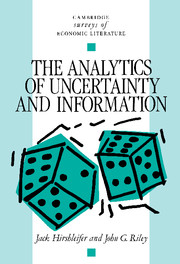Book contents
- Frontmatter
- Contents
- Acknowledgments
- Introduction: The economics of uncertainty and information
- Part I
- Part II
- 5 Information and informational decisions
- 6 The economics of emergent public information
- 7 Research and invention
- 8 Informational asymmetry and contract design
- 9 Strategic uncertainty and equilibrium concepts
- 10 The economics of contests
- 11 Competition and hidden knowledge
- 12 Long-run relationships and the credibility of threats and promises
- Index
5 - Information and informational decisions
Published online by Cambridge University Press: 05 June 2012
- Frontmatter
- Contents
- Acknowledgments
- Introduction: The economics of uncertainty and information
- Part I
- Part II
- 5 Information and informational decisions
- 6 The economics of emergent public information
- 7 Research and invention
- 8 Informational asymmetry and contract design
- 9 Strategic uncertainty and equilibrium concepts
- 10 The economics of contests
- 11 Competition and hidden knowledge
- 12 Long-run relationships and the credibility of threats and promises
- Index
Summary
In part I of this book, covering the economics of uncertainty, the key topics addressed were (1) individuals' optimizing “terminal” choices with regard to the bearing of risk, and (2) the market equilibrium determined by the aggregate of such individual decisions. In turning here in part II to the economics of information, we will similarly be considering issues on the individual and on the market levels of decision. On the individual level, the central question is: supposing you could get additional information before having to make a terminal decision, how ought you to decide whether and how much information to collect? On the market level, the main question is: what is the nature of the overall equilibrium that arises when some or all individuals undertake such “informational” actions?
After some introductory discussions, the present chapter first analyzes individuals' decisions as to the acquisition of information. We then consider the informational choices of groups, since the necessity to act as a collectivity has significant consequences for the nature and amount of information desired. Later chapters take up the implications for market equilibrium.
Information – some conceptual distinctions
“Information” is a word with many meanings. Some of the distinctions to be brought out here will be useful in what follows.
Information as knowledge versus information as news
Information is sometimes taken to mean knowledge – an accumulated body of data or evidence about the world.
- Type
- Chapter
- Information
- The Analytics of Uncertainty and Information , pp. 167 - 224Publisher: Cambridge University PressPrint publication year: 1992
- 2
- Cited by



